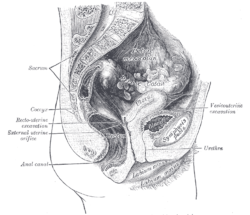Rectovaginal fascia
Appearance
| Rectovaginal fascia | |
|---|---|
 Sagittal section of the lower part of a female trunk, right segment. (Rectovaginal fascia not labeled, but region is visible.) | |
 Median sagittal section of female pelvis. (Rectovaginal fascia not labeled, but region is visible.) | |
| Details | |
| Identifiers | |
| Latin | fascia rectovaginalis |
| TA98 | A04.5.03.004F |
| TA2 | 3832 |
| FMA | 19934 |
| Anatomical terminology | |
The rectovaginal fascia (often called rectovaginal septum or sometimes fascia of Otto) is a thin structure separating the vagina and the rectum. This corresponds to the rectoprostatic fascia in the male.[1]
Clinical significance
[edit]Perforations in it can lead to rectocele.[2][3]
References
[edit]- ^ "Dorland's Medical Dictionary". Retrieved 2007-12-11.
- ^ Ludwikowski B, Hayward IO, Fritsch H (2002). "Rectovaginal fascia: An important structure in pelvic visceral surgery? About its development, structure, and function". J. Pediatr. Surg. 37 (4): 634–8. doi:10.1053/jpsu.2002.31624. PMID 11912525.
- ^ Kenton K, Shott S, Brubaker L (1999). "Outcome after rectovaginal fascia reattachment for rectocele repair". Am. J. Obstet. Gynecol. 181 (6): 1360–3, discussion 1363–4. doi:10.1016/S0002-9378(99)70406-0. PMID 10601913.
External links
[edit]
